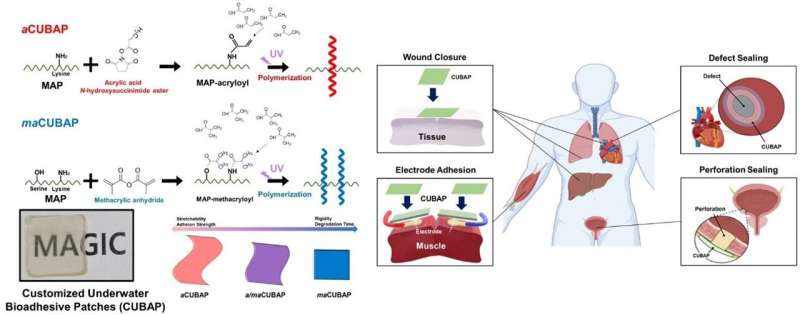This article has been reviewed according to Science X's editorial process and policies. Editors have highlighted the following attributes while ensuring the content's credibility:
fact-checked
trusted source
proofread
Researchers use mussel-derived proteins to develop customized underwater bio-adhesive patches

The field of adhesives is diverse, catering to a wide range of applications from everyday uses like paper and fabric to specialized ones like woodwork. In the medical area, adhesives play a crucial role, from suturing internal wounds to attaching sensors and implanting medical devices. A recent breakthrough in this field has generated considerable excitement: the development of medical adhesives that are not only safe for human use but also customizable for different organs.
Professor Hyung Joon Cha from Pohang University of Science and Technology (POSTECH), along with Ph.D. candidate Jang Woo Yang (POSTECH), senior researcher Hwa Hui Shin (K-MEDI Hub), and Professor Kang-Il Song (PKNU), have garnered attention by using mussel-derived adhesive proteins to develop customized underwater bio-adhesive patches (CUBAP). Their research is published in the journal Advanced Materials.
These patches are crucial in effectively sealing internal wounds, leaks, and perforations in the body's organs, aiding in healing and tissue regeneration. As research in internal transplant devices expands, there is a growing need for adhesives that can securely hold these devices in place.
The biomedical adhesives used in such applications need to maintain strong adhesion underwater while minimizing side effects. The ability to customize features like biodegradation time is also essential, considering the unique biological environments of different organs.
Professor Hyung Joon Cha's research team members, pioneers in applying mussel adhesive proteins for medical adhesives, have taken a step further with the development of CUBAP.
This adhesive is not only excellent in underwater adhesion but is also made from natural materials, ensuring safety and biocompatibility within the human body. The team has produced customized patches (CUBAP) by combining mussel adhesive protein with polyacrylic acid and polymethacrylic acid, and these are currently undergoing clinical evaluation for minimizing scarring in skin closures.
In its dry state, the patch is non-adhesive, but in the human body or other humid environments, it exhibits strong adhesive properties. Furthermore, researchers can control the degradation time and mechanical hardness by adjusting the polyacrylic acid and polymethacrylic acid ratios. This enables a customized adhesive system, considering the diverse structural and biological needs of different organs.
The research team created three types of customized adhesive patches and applied them in animal treatments and implants. These patches maintained high adhesion even in highly mobile organs such as the heart and bladder. They also conducted successful experiments in adjusting biodegradation times and flexibility during the transplantation of muscle regeneration electronic devices.
Professor Cha, the senior researcher, said, "This research paves the way for personalized medical applications. We plan to enhance and refine the process through subsequent studies, with the goal of effective applications in diverse biomedical fields."
Senior Researcher Hwa Hui Shin from K-MEDI Hub said, "Our study has confirmed the effectiveness and versatility of the developed bio-adhesive patches. We look forward to their evolving into commercial products, meeting the demands of the health care sector."
More information: Jang Woo Yang et al, A Customizable Proteinic Bioadhesive Patch with Water‐Switchable Underwater Adhesiveness, Adjustable Biodegradability, and Modifiable Stretchability for Healing Diverse Internal Wounds, Advanced Materials (2023). DOI: 10.1002/adma.202310338
Provided by Pohang University of Science and Technology





















